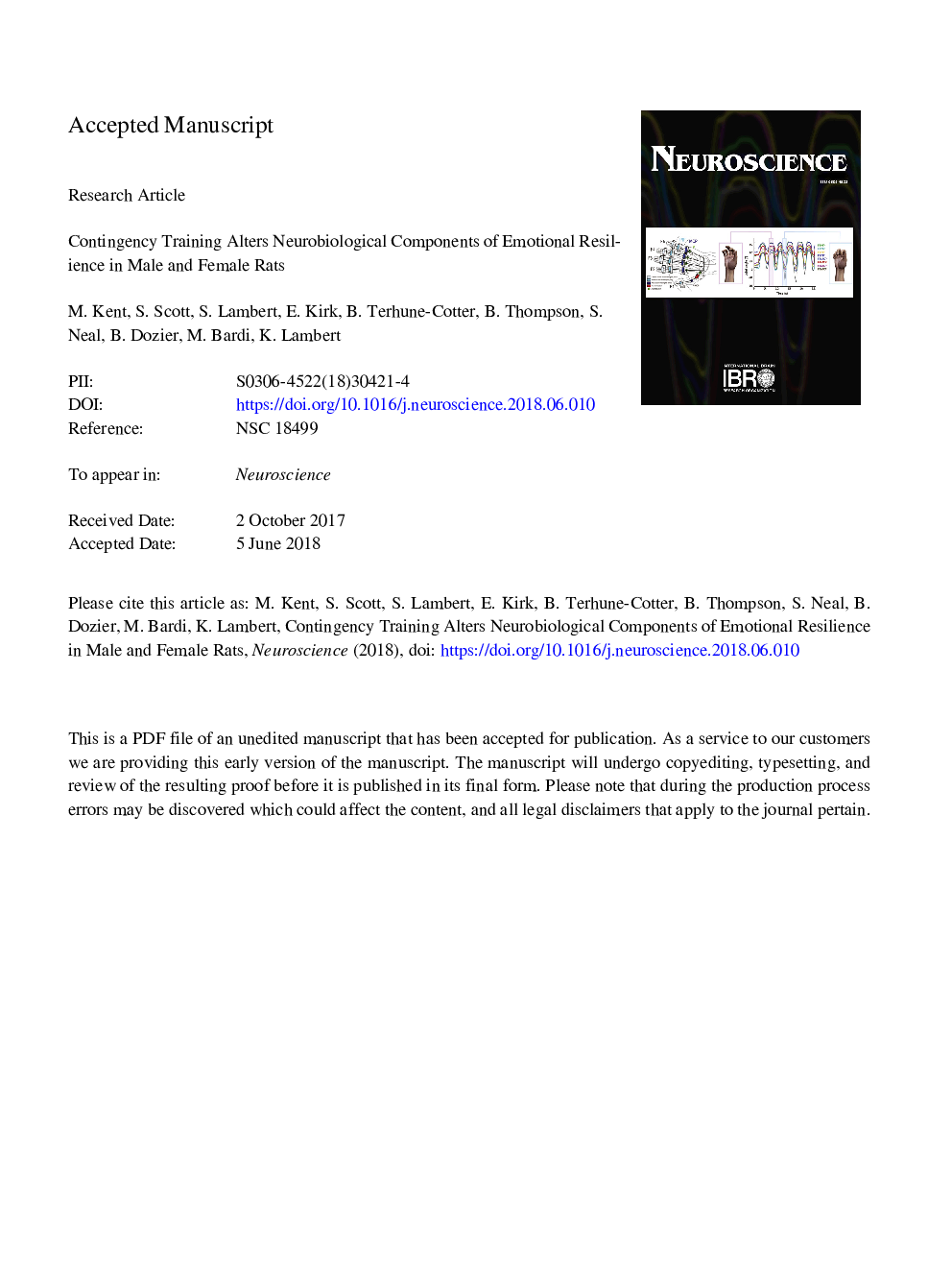| کد مقاله | کد نشریه | سال انتشار | مقاله انگلیسی | نسخه تمام متن |
|---|---|---|---|---|
| 8840539 | 1614690 | 2018 | 60 صفحه PDF | دانلود رایگان |
عنوان انگلیسی مقاله ISI
Contingency Training Alters Neurobiological Components of Emotional Resilience in Male and Female Rats
ترجمه فارسی عنوان
آموزش احتمالی باعث تغییر ساختارهای عصبی زیستی از انعطاف پذیری احساسی در موشهای صحرایی و نر و ماده می شود
دانلود مقاله + سفارش ترجمه
دانلود مقاله ISI انگلیسی
رایگان برای ایرانیان
کلمات کلیدی
CuSGLMMDDC-TdehydroepiandrosteroneDHEADLMEBRcontingency - احتمالیMajor depression disorder - اختلال افسردگی عمدهchronic unpredictable stress - استرس غیر قابل پیش بینی مزمنStress - استرس یا فشار روانیMANOVA - انتخاب کنیدResilience - انعطاف پذیریmultivariate analysis of variance - تجزیه و تحلیل چند متغیره واریانسSpatial memory - حافظه فضاییBehavioral therapy - درمان رفتاریGeneral linear model - مدل خطی کلیCoping - مقابلهCORT - کورتCorticosterone - کورتیکوسترون
موضوعات مرتبط
علوم زیستی و بیوفناوری
علم عصب شناسی
علوم اعصاب (عمومی)
چکیده انگلیسی
Prior research with a rat model of behavioral therapy [i.e., effort-based reward (EBR) contingency training] suggests that strengthened associations between physical effort and desired outcomes enhance neurobiological indices of resilience. In the current study, male and female Long-Evans rats were exposed to either six weeks of EBR training or noncontingent training prior to 10â¯days of exposure to chronic unpredictable stress (CUS). Subsequently, all animals were exposed to a problem-solving task and then trained in a spatial learning/foraging task, the Dry Land Maze (DLM). Following habituation training and test trials, rats were assessed in a probe trial that generated a prediction error (cognitive uncertainty). Results indicated that, during CUS exposure, contingency-training enhanced dehydroepiandrosterone/corticosterone ratios (consistent with healthier stress responses), especially in male rats. Additionally, contingency training increased exploratory behaviors in the probe trial as well as differentially influenced on-task problem-solving performance in males and females. Following the probe trial, brains were exposed to histological analyses to determine the effects of sex and contingency training on various neurobiological markers. Contingency training decreased BDNF-immunoreactivity (ir) in the hippocampus CA1 and lateral habenula, implicating differential neuroplasticity responses in the training groups. Further, coordinated fos-ir activation in areas associated with emotional resilience (i.e., motivation-regulation) was observed in contingent-trained animals. In sum, the current findings confirm that behavioral training is associated with neurobiological markers of emotional resilience; however, further assessments are necessary to more accurately determine the therapeutic potential for the EBR contingency training model.
ناشر
Database: Elsevier - ScienceDirect (ساینس دایرکت)
Journal: Neuroscience - Volume 386, 21 August 2018, Pages 121-136
Journal: Neuroscience - Volume 386, 21 August 2018, Pages 121-136
نویسندگان
M. Kent, S. Scott, S. Lambert, E. Kirk, B. Terhune-Cotter, B. Thompson, S. Neal, B. Dozier, M. Bardi, K. Lambert,
